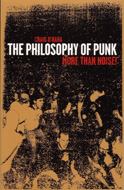 |
|
October 27, 2003book: philosophy of punk
First things first, let's just be clear that when we use the word philosophy here, we're not talking Kant (thank god), and we're not talking Wittgenstein... but we are talking about a possibly fascinating look at a largely misunderstood sub-culture... one with often conflicting views from it's own members. Unfortunately this book is not quite there. In true punk spirit, however, O'Hara's book is a DIY (do-it-yourself) effort from the ground up. Fanzines (e.g., Maximum Rock n' Roll, Profane Existence, ...) and album liner notes form the primary sources of the book, which chronicles punk viewpoints on media misrepresentation, zines, anarchism, gender, sexuality, and environmentalism. For the most part little new is gleamed, though the book does a nice job of taking various snapshots of the (primarily early 90's) punk world. Skinheads (even the steadfastly anti-racist breed) and straight-edgers, however, are given particularly scathing treatment, as the author characteristically sways between a pseudo-objective tone and unrestrained vitriolic opinion. The same style, if you ask me, that so often characterizes punk. I did appreciate the book's chapter on anarchism, as it was one of the few sections where I encountered some new perspectives, and set me on a path to discover some interesting readings such as this one. I also discovered that true punks, according to O'Hara's view, are utopians: "anarchy does not just mean no laws, it means no need for laws." What really struck me, though, was how deeply the rhetoric of rebellion is woven into punk philosophy as presented. In seems that most punk causes can be formulated to always begin with the prefix "anti-". In so doing, it runs the risk of ever being a counter-culture, defined largely by resistance and therefore existing as a reactive movement, its identity dependent on the larger culture it lashes back against. As such, punk is limited, willingly or unwillingly, to merely modifying the culture it would like to see obliterated. This observation is an over generalization, of course: punk acts continue to promote more egalitarian financial models (e.g., the wonderful folks from Fugazi), and other trends in the sub-culture, particularly gender and environmental issues, tend to promote a more proactive outlook. If punk truly still exists in this day in age (it always seems to be pronounced dead or dying), it will be interesting to see how it further evolves. In the end, I wouldn't recommend going out of your way to get ahold of this book. But if you're either interested or completely ignorant of punk, and like me, find this book sitting on a friend's bookshelf, pick it up and give it a read. At the very least, it will get you thinking. Or, if you want to expose yourself to one of the more beautiful (and for my young teenage self, life-changing) expressions of punk philosophy, buy this album and learn all the lyrics by heart. Posted by jheer at October 27, 2003 10:21 PMComments
ah, you just made me go find op ivy on my ipod. . "to resist despair in this world is what it is to be free"... it has the ring of buddhist philosophy to it, don't you think? Posted by: metamanda at October 28, 2003 11:43 AMdude,your article rocks.im definatly gonna buy that book.also,i love the fact you highlighted operation ivy as a lifechanging and beautiful expression of punk philosophy.i completely agree.keep up the good work. Posted by: james at October 26, 2004 01:25 PMTrackback Pings
Trackback URL
|
| jheer@acm.Ýrg |
 I just finished reading an interesting little book from self-proclaimed radical publisher
I just finished reading an interesting little book from self-proclaimed radical publisher